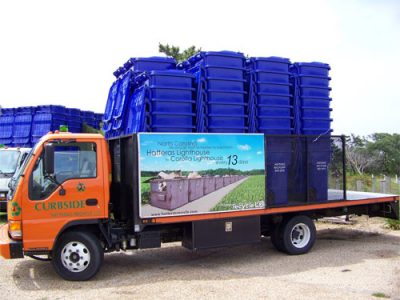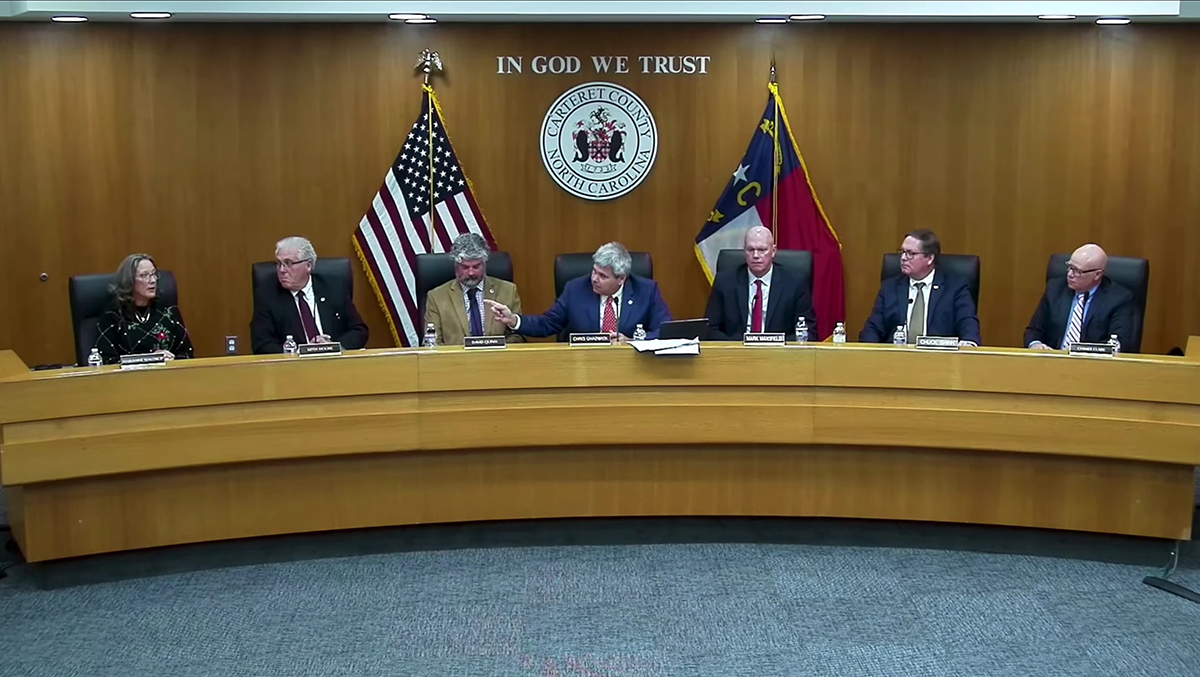Reprinted from Island Free Press
An ongoing crisis with U.S. recycling markets came home to roost this fall when Hatteras Recycle was informed its tipping fees would go up 600 percent as of Dec. 1.
Supporter Spotlight

“We have had a bombshell dropped on us,” said Greg Mitchell, manager at the company that provides curbside recycling services for Hatteras Island. “This is not just a localized thing. This is (happening) on a national level.”
After getting over the shock when receiving the Oct. 10 letter from Bay Disposal & Recycling in Powells Point, he said the company, which services about 1,500 rental properties and 300-400 local residences, has resolved to review its options and find a solution before their program resumes on Easter week.
“We’ve had some really good conversations with the county,” Mitchell said. “Hopefully, we’ll have some answers after the first of the year.”
Todd Phillips, who launched Hatteras Recycle 13 years ago, said he had just secured sale of his company when he learned of the price spike.
“When I saw that tipping fee … that’s like hitting a wall,” Phillips said. “It’s triple the national rate for what garbage is. I was like, ‘How can this be?’”
Supporter Spotlight
Phillips then reached out to the state and county, which were facing similar challenges on how to address the steep price increases for recycling. From those discussions, he came to believe that the issue can be addressed in a practical way by going back to basics.
“Here’s the unpopular truth about this – single stream recycling doesn’t work,” he said.
By throwing recyclables in the same container, he said, it has resulted in either more processing to make the product marketable, or so much contamination that the recyclables have to be thrown out at the landfill.
But as it turns out, contamination – especially with glass – is a major problem that needs to be addressed to solve the current crisis.
As Phillips explained, the price spike to dispose of recycled materials in the U.S. is a direct consequence of the Chinese government cutting off imports of recycled materials last year, leaving no market for American haulers to dispose of the product. A big reason for the Chinese rejection, he said, is that much of the plastic material is contaminated, although some believe the 2017 release of the documentary “Plastic China,” a searing expose of the Chinese workers, including children, picking through mountains of filthy plastic garbage, may have caused the closure.
“They gave the U.S. a year’s warning, but everyone was asleep at the wheel,” he said. “The mantra we’re going with is (that) we have to take a step backward to move forward. We’re taking the glass out. We’re going to re-educate our customers: Do not contaminate the stream or there will not be any more recycling.”
Hatteras Recycle now has new owners, Peter and Beth Eady, who were relocating to Hatteras Island from Wilmington. Phillips, who recently moved near his family in Cape Cod and lives part time in Waves, said he has retained a financial stake in the company and plans to remain active in keeping it viable for the community.
In its 2018 season, from Easter until Thanksgiving, Hatteras Recycle collected 425 tons of material, Phillips said. That translates to a savings of $30,000 in landfill tipping fees. For that reason, he said, Hatteras Recycle is hoping to work out an arrangement with Dare County that would credit the company for a portion of those savings, in turn offsetting the increased fees for disposal of recyclables.
“We’re going to re-focus on banned materials – aluminum, steel, plastic – that are not allowed in the landfills,” he said. “We’re providing these services to keep them compliant.”
Phillips said he has also proposed finding a volunteer crew to staff the county recycling drop-off center in Rodanthe. If the county would allow volunteers, Phillips said he would be seeking locals who would be willing to chip in the time in order to have the convenience of not having to travel to the Buxton site.
Shanna Fullmer, Dare County public works director, said that the county doesn’t have the same issue with co-mingling its recyclables. It has a glass crusher that saves on transport costs for recycled glass. The county also uses a compactor for recyclables – aluminum and steel cans, plastic bottles, paper and cardboard.
The crushed glass, she said, is available for free to the public, who use it for garden mulch, arts and crafts, and as a component of driveway material.
“Dare County isn’t in as rough shape as other places because we’re already separating these things out,” she said.
Between July 1, 2017, and June 30, 2018, Fullmer said, the county collected 1,557.29 tons of recyclable materials, 4,900 pounds of household hazardous waste, 6,600 gallons of motor oil, 560 gallons of antifreeze and 29 to 30 tons of electronics.
Fullmer said the county has been negotiating with Bay Disposal about fee adjustments and is working on solutions to help Hatteras Recycle. It is also partnering with the state on a consumer education program to foster better understanding of what’s recyclable and what’s not.
“The state has actually been very involved and very supportive and proactive in working on finding a solution,” she said. There may be grant opportunities available, or the possibility of having a regional MRF (material recovery facility) provided to help sort the recyclables. The idea, she said, is to keep contamination at a minimal.
“That helps bring the prices back down, and you’re getting the cleanest possible product to market,” Fuller said.
The North Carolina Department of Environmental Quality and the nonprofit Carolina Recycling Association have started offering “anti-contamination” workshops to local governments, waste haulers and recycling service providers, said Mike Greene, recycling business development specialist for the state Division of Environmental Assistance and Customer Service.
Tools are also published online, he said, including social media strategies, brochures and advertising methods to promote “a common set of educational materials.”
“We’re relying on the local communities to do the outreach to their people,” Greene said.
The reality is that China needs the recycled material, he said, and the U.S. has the means and the will to provide clean material. In addition to limiting contamination at the source, there are plans to improve operation of MRFs. There is also speculation, he said, that warehouse-like facilities can be constructed at different areas of the country to process and pack pre-cleaned material to send to China.
Last year, there were 17,000 private industry recycling jobs in North Carolina, Greene said, and it is an important and growing sector of the state’s economy.
“I think we’re rebuilding recycling the right way,” he said.
And even at a small scale, Phillips believes that Hatteras Recycle, which has provided eight to 10 good jobs, is an important contributor to the community. Plus, he said, the tourists expect to be able to recycle. Recycling is also a necessity in maintaining a clean environment, especially when landfill space is limited.
“There is a way forward – reeducation and finding local end markets,” Phillips said. “The whole shipping into China – it was fast and easy, out of sight, out of mind.”
Still, there is a huge demand, he said, for clean plastic waste, which is reused in manufacturing – although plastic grocery bags “are a nightmare,” he added. Recycling needs to adapt, and businesses like Hatteras Recycle are an important part of the solution.
“I’m going to be completely involved with this for the foreseeable future,” Phillips said.
This story is provided courtesy of the Island Free Press, a digital newspaper covering Hatteras and Ocracoke islands. Coastal Review Online is partnering with the Free Press to provide readers with more environmental and lifestyle stories of interest along our coast.







